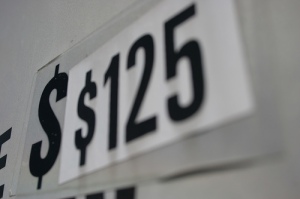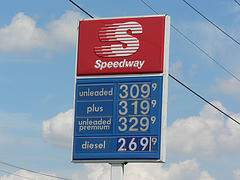[caption id="attachment_492" align="aligncenter" width="300" caption="(flickr credit: sharpstick's photos)"]
 [/caption]
[/caption]In married life, the Internet has allowed us to compare prices without actually having to visit stores (much like the telephone allows), in fact we can compare prices without actually interacting with another person. It feels like a safe anonymous inexpensive activity. Ebay started introducing us to live on the wild side by bidding for things at "less than" the asking price. Until recently this was the extent of our financial education until I met my friend Cindy at work and she introduced me to the idea of "asking for a better price". "The worst they can say is no" she explained. So in small ways I began to assert my desire for fairer prices. Saving $200 on fees associated with buying a car, saving $15 off the price of a pair of shoes. Spotting inconsequential defects and asking the cashier for a deduction.
Experience has eroded my confidence that retail prices accurately reflect value
I remember being shocked to observe retail markup first hand when i worked at the garden centre. I saw two things that forever changed my view on pricing.
1. The first was observing products coming in at a wholesale price and immediately being marked up to a retail price that was 2 times the wholesale. The $4 items became $8 items, and the $40 items became $80 items. I was alarmed that at the garden centre 1/2 of every price was basically profit.
2. The second was re-potting plants. When a plant outgrew its 1 gallon pot, we would pull it out and place it in a 2 gallon pot surrounded with fresh dirt. So on Friday the shrub was a 1 gallon plant for $4 and on Saturday it was a 2 gallon plant for $7. In some cases the re-potting would only be half complete, and customers would pass over the 1 gallon shrubs to purchase a 2 gallon shrub (the plants were identical).
I think you will share some of the other experiences I've had;
- Gas wars where 2 gas stations compete on price and the cost of a litre of fuel drops and drops to ridiculous prices (like 1cent for a litre).
- Electronics where the retail price drops month after month, while other electronics like the Wii where the retail price remains constant for years.
- Recently crude oil prices plummeted while gasoline prices remained at record high levels for over a year.
[caption id="attachment_493" align="aligncenter" width="240" caption="(flickr caption: Micah Maziar)"]
 [/caption]
[/caption]Clearly the retail price is not a reflection of value in all cases. The prices rise and fall despite constant demand and identical products. The prices you see are not the direct result of a "market effect" but rather the contrived price of marketeers. In some cases, nobody pays the same price, such as in the case of "yield management" where the airlines use complex formulas in their attempt to extract as much money as possible from each customer for a seat on the same plane.
Very recently on a trip to Mexico, I saw how a silver right for $80 could be purchased for $35. How? by haggling. A bead bracelet for $5 becomes 2 for $7 at a cost of $3.50 each. Now there are the long faces and the sad stories of large families at home in need of money, but don't tear up, it is a game. In the 5 minutes it took you to pay $7, you supplied 1/3 of the average Mexicans daily wage. This whole process of haggling over prices felt uncomfortable to me. As someone accustomed to paying sticker price. I feel awkward haggling or arguing over price. Because the "price tag" is what the man asked, I feel compelled to pay it. After the face I am faced with the tension (maybe unhappiness) that results from having options in the price I pay. My joy at "finding a good price" is robbed from me when I realize that I could have negotiated a "better price". When I do haggle for a "better price" I wonder if I got he best price, or did I settle too high?
[caption id="attachment_494" align="aligncenter" width="300" caption="(flickr credit: Pandiyan)"]
 [/caption]
[/caption]The only solution I have found to this unhappiness with the prices I've paid is the value proposition. What is the value of this to me and given this value am I content with the price I paid for this product. For me the value proposition includes; the price I must pay, the quality of the product, the level of customer service I receive and the social impact of the product through its manufacture and associated labour and waste (explained clearly in "the story of stuff"). If I am content, then it does not matter that someone else got a better price or that the price dropped the next week. I am content, I make my purchase and (unless there is a deal to refund my money when the price drops) I walk away secure that I made a choice and paid a price I was content with.
I wish you success in leveraging the "value proposition" for your own peace of mind in purchasing.
Greg.
No comments:
Post a Comment